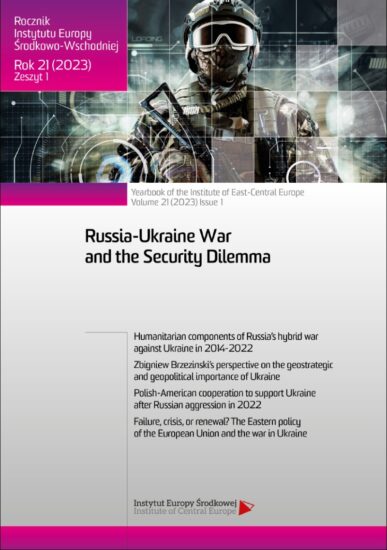Sekurytyzacja imigracji w Polsce. Kontekst społeczny i polityczny
ORCID: Jan Gondek: 0000-0001-6444-6990
Strony: 251-267
Wydanie: Lublin 2023
DOI: https://doi.org/10.36874/RIESW.2023.1.15
Sposób cytowania: G. Tutak, J. Gondek, The securitization of immigration in Poland. Social and political contexts, „Rocznik Instytutu Europy Środkowo-Wschodniej” 21 (2023), z. 1, s. 251-267,
DOI: https://doi.org/10.36874/RIESW.2023.1.15
Słowa kluczowe: immigration, immigration policy, securitization, security
Abstrakt: Currently, immigration issues occupy an important place in the debate on the future of Europe. One of the central themes of this debate is the issue of security. In spite of the functioning of supranational integration structures, individual states still remain a fundamental factor in shaping migration. In many cases, the issue of immigration is subjected to the process of securitization, framing immigration as a threat. It is the speech act that is important in this respect, being a kind of securitizing tool. Since 2015, one can notice elements indicating that the process of securitization of immigration has been present in Poland, too, which, among other things, is a consequence of the change of the ruling party, the immigration crisis that has taken place in Europe, and the migration situation on Poland’s eastern border. The article presents the factors that influence the process of immigration securitization. Additionally, it includes numerous statements from Polish politicians securitizing the problem of immigrants as well as the results of social surveys on attitudes towards immigration. The analysis of the collected material leads to the conclusion that the securitisation of immigration in Poland is not a completed process and that this process concerns a geographically defined group of immigrants.
Bibliografia:
1. Adamson F.B., Crossing borders: International migration and national security, “International Security” 2006, vol. 31, no. 1.
2. Badania bezpieczeństwa. Wprowadzenie, [in:] P.D. Williams (ed.), Studia bezpieczeństwa, translated by W. Janicki, Cracow 2012.
3. Badora B., Stosunek do przyjmowania uchodźców, CBOS, komunikat z badań nr 169/2016, Warsaw 2016, https://www.cbos.pl/SPISKOM.POL/2016/K_169_16.PDF.
4. Buzan B., Wæver O., De Wilde J., Security: A new framework for analysis, Boulder 1998.
5. Castles S., Miller M.J., Migracje we współczesnym świecie, Warsaw 2011.
6. Feliksiak M., Polacy wobec uchodźców z Ukrainy, CBOS, komunikat z badań nr 62/2022, Warsaw 2022, https://www.cbos.pl/SPISKOM.POL/2022/K_062_22.PDF.
7. Feliksiak M., Stosunek do przyjmowania uchodźców, CBOS, komunikat z badań nr 163/2017, Warsaw 2017, https://www.cbos.pl/SPISKOM.POL/2017/K_163_17.PDF.
8. Fijałkowski Ł., Teoria sekurytyzacji i konstruowanie bezpieczeństwa, “Przegląd Strategiczny” 2012, no. 1.
9. Freeman G.P., Immigration as a source of political discontent and frustration in Western democracies, “Studies in Comparative International Development” 1997, no. 3.
10. Gerard A., The securitization of migration and refugee women, London–New York 2014.
11. Guild E., van Selm J. (eds.), International migration and security. Opportunities and challenges, New York 2005.
12. Hollifield J.F., Immigrants, markets and states. The Political economy in post-war Europe, Cambridge 1992.
13. Hollifield J.F., Jacobson D., Migration and the state, [in:] G. Ritzer (ed.), The Wiley-Blackwell Encyclopaedia of Globalization, Chichester, West Sussex, Malden 2012.
14. Hollifield J.F., The emerging migration state, “The International Migration Review” 2004, vol. 38, no. 3.
15. Jaroszewicz M., Migracje i bezpieczeństwo, [in:] M. Lesińska, M. Okólski (eds.), 25 wykładów o migracjach, Warsaw 2018.
16. Kaczyński: Pasożyty i pierwotniaki w organizmach uchodźców groźne dla Polaków, 13 October 2015, https://www.newsweek.pl/polska/jaroslaw-kaczynski-o-uchodzcach/89mwbx3.
17. Kostecki W., Europe after the Cold War. The security complex theory, Warsaw 1996.
18. Kowalczuk K., Polacy wobec problemu uchodźstwa, CBOS, komunikat z badań nr 81/2015, Warsaw 2015, https://www.cbos.pl/SPISKOM.POL/2015/K_081_15.PDF.
19. Kowalczuk K., Przybysze z bliska i daleka, czyli o imigrantach w Polsce, CBOS, komunikat z badan nr 93/2015, Warsaw 2015, https://www.cbos.pl/SPISKOM.POL/2015/K_093_15.PDF.
20. Legut A., Pędziwiatr K., Sekurytyzacja migracji w polityce polskiej a zmiana postaw Polaków wobec muzułmanów, [in:] R. Jończy (ed.), Sami swoi? Wielokulturowość we współczesnej Europie, Gliwice–Opole 2018.
21. Lubieweski P., Nielegalna imigracja. Zagrożenia bezpieczeństwa, Szczytno 2016.
22. Morawiecki: Granica państwa jest świętością, za którą przelewały krew pokolenia Polaków, 8 November 2021, https://www.gazetaprawna.pl/wiadomosci/kraj/artykuly/8287642,morawiecki-polska-granica-imigranci.html.
23. Nałęcz M., Zbigniew Ziobro o imigrantach: nie możemy do tego podchodzić na hurra, jak PO, 9 October 2019, https://www.o2.pl/informacje/zbigniew-ziobro-o-imigrantach-nie-mozemy-do-tego-podchodzic-na-hurra-jak-po-6433233533953665a.
24. Pędziwiatr K., Islamophobia in Poland. National Report 2016, [in:] E. Bayrakli, F. Hafeza (eds.), European Islamophobia Report 2016, Istanbul 2017.
25. Raczyński R., Wpływ migracji międzynarodowych na bezpieczeństwo wewnętrzne państwa, “Bezpieczeństwo. Teoria i Praktyka” 2015, no. 2.
26. Szef MSWiA o uchodźcach: nie przyjmiemy nikogo, kto zagrażałby bezpieczeństwu, 9 May 2016, https://polskieradio24.pl/5/3/Artykul/1617294,Szef-MSWiA-o-uchodzcach-nie-przyjmiemy-nikogo-kto-zagrazalby-bezpieczenstwu.
27. Szulecka M., Migracje jako źródło wybranych zagrożeń porządku prawnego i publicznego. Wnioski z badań jakościowych, [in:] W. Klaus, K. Laskowska, I. Rzeplińska (eds.), Przestępczość cudzoziemców – aspekty prawne, kryminologiczne i praktyczne, Warsaw 2017.
28. Szydło usztywnia stanowisko. Miało być 100 uchodźców, nie będzie żadnego, 24 March 2016, https://wiadomosci.dziennik.pl/polityka/artykuly/516410,beata-szydlo-rzad-pis-uchodzcy-imigranci-stanowisko-zamachy-bruksela-belgia.html.
29. Taureck R., Securitization theory and securitization studies, “Journal of International Relations and Development” 2006, vol. 9, no. 1.
30. Tutak G., Polityka migracyjna Polski wobec europejskiego kryzysu migracyjnego, “Świat Idei i Polityki” 2017, no. 17.
31. Vaughan-Williams N., We are not animals! Humanitarian border security and zoopolitical spaces in Europe, “Political Geography” 2015, vol. 45.
32. Ziętek A.W., Sekurytyzacja migracji w bezpieczeństwie kulturowym Europy, “Teka Komisji Politologii i Stosunków Międzynarodowych” 2017, vol. 12, no. 3.
Słowa kluczowe: immigration, immigration policy, securitization, security
PDF: Pobierz